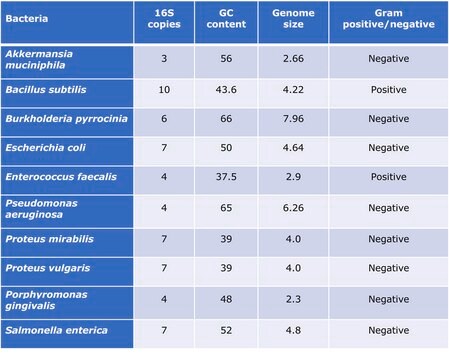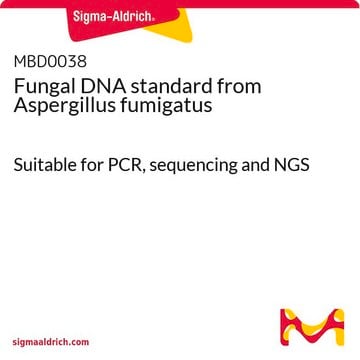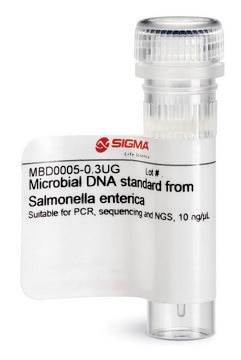MBD0044
Fungal DNA standard from Candida albicans
Suitable for PCR, sequencing and NGS, 10 ng/μL
Sign Into View Organizational & Contract Pricing
All Photos(1)
About This Item
UNSPSC Code:
41105500
NACRES:
NA.51
Recommended Products
General description
Standardization of sample analysis is essential in microbiome genomics research workflow. Lack of standardization can lead to biases and errors in common processes during sample preparation and analysis such as sample amplification, sequencing, and bioinformatics analyses.1 The human microbiome includes not only bacteria, but also viruses and fungi. While the “bacteriome” field has been researched extensively in the past years, fungi including yeasts, comprising the “mycobiome”, remain relatively neglected. Fungi and yeasts have been shown to be involved in illness conditions such as cancer and gastrointestinal disease. The human gut is populated by three fungal phyla, Ascomycota, Basidiomycota, and Zygomycota.
The fungal microbial genomic DNA standard from Candida albicans can serve as standard for benchmarking the performance along the workflow of microbiome research and metagenomic analyses, as well as a tool to increase reproducibility and allow comparison of results obtained by different labs.
Candida albicans is an opportunistic human fungal pathogen belonging to Ascomycota. It exists as a harmless commensal in the gastrointestinal and genitourinary tracts in about 70% of humans and about 75% of women suffer from Candida infection at least once in their lifetime. C. albicans has emerged as a model organism for studying fungal pathogens along with other two fungi: Aspergillus fumigatus and Cryptococcus neoformans.2
Read here how to use our standards to ensure data integrity for your microbiome research.
The fungal microbial genomic DNA standard from Candida albicans can serve as standard for benchmarking the performance along the workflow of microbiome research and metagenomic analyses, as well as a tool to increase reproducibility and allow comparison of results obtained by different labs.
Candida albicans is an opportunistic human fungal pathogen belonging to Ascomycota. It exists as a harmless commensal in the gastrointestinal and genitourinary tracts in about 70% of humans and about 75% of women suffer from Candida infection at least once in their lifetime. C. albicans has emerged as a model organism for studying fungal pathogens along with other two fungi: Aspergillus fumigatus and Cryptococcus neoformans.2
Read here how to use our standards to ensure data integrity for your microbiome research.
Application
Suitable as a standard for PCR, Sanger and next generation sequencing (NGS).
Features and Benefits
- Individual microbial standard for microbiomics and meta-genomics workflow
- Suitable standard for PCR, Sanger sequencing and 18S NGS
- Improves bioinformatics analyses
- Increases reproducibility and repeatability
- Identity and purity of the genomic Candida albicans DNA has been confirmed by 18S NGS and gel electrophoresis
Physical form
Liquid -The genomic DNA is provided at ≥10 ng/μl concentration in TE buffer pH 8.0
Storage Class Code
12 - Non Combustible Liquids
WGK
nwg
Choose from one of the most recent versions:
Certificates of Analysis (COA)
Lot/Batch Number
Don't see the Right Version?
If you require a particular version, you can look up a specific certificate by the Lot or Batch number.
Already Own This Product?
Find documentation for the products that you have recently purchased in the Document Library.
Articles
DNA standards enhance metagenomics research integrity, offering precise species study and mixed community standards.
Our team of scientists has experience in all areas of research including Life Science, Material Science, Chemical Synthesis, Chromatography, Analytical and many others.
Contact Technical Service







